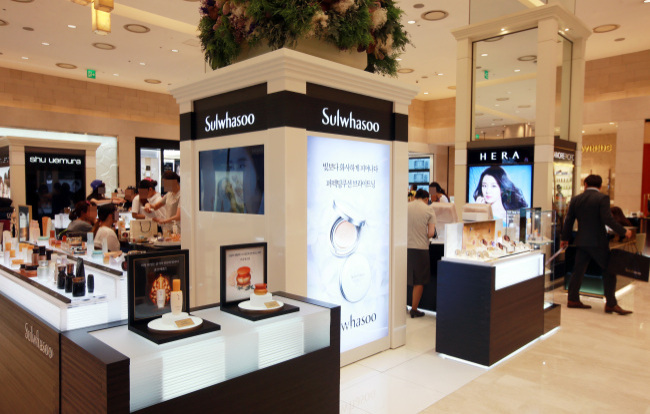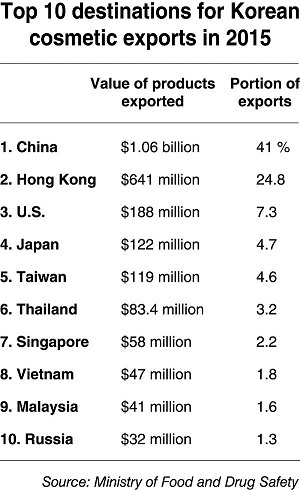Last Friday, when South Korea and the U.S. announced plans to deploy here an advanced U.S. missile defense system, shares of South Korea’s leading cosmetics maker
AmorePacific tumbled.
The stocks fell more than 4 percent, losing more than 1 trillion won in value just one day, as investors feared China, which had long been strongly opposing the system’s deployment in the Korean Peninsula, might pursue economic retaliation against South Korea.
 |
Cosmetics shops inside the main Shinsegae Department Store in central Seoul (Yonhap) |
The July 8 stock market fluctuation reflects one of the core risks faced by AmorePacific, which relies heavily on Chinese consumers both on the mainland and on vacation to Korea.
The Korean cosmetics giant’s heavy dependence on China can be a double-edged sword, as the company stands vulnerable to several risks that sit outside its control, experts said.
“The risk of being highly dependent on the China market is too high. China is definitely not an easy market. Things can quickly go bad,” said Park Ju-gun, the joint chief executive of Seoul-based corporate research service CEO Score.
AmorePacific has posted stellar growth figures of late, with its flagship cosmetics brands like Sulwhasoo and Laneige hitting the mark with Chinese consumers.
In 2015, the company’s domestic sales rose 23 percent on-year to 4.77 trillion won ($4.16 billion) — around 25 percent of which came from duty-free channels led by Chinese tourists. Its overseas sales surged 44.4 percent on-year to 1.26 trillion won last year, of which more than 50 percent are speculated to have come from China.

Analysts say that the chilled Korea-China relations over the missile defense issue are unlikely to evolve into a major trade conflict. But there is a chance that Chinese public sentiment might turn negative against Korea, dampening the demand for Korean products.
“In the case that Chinese consumers begin to harbor anti-Korea sentiments, it could lead to a decline in demand for Korean cosmetics in China,” said Samsung Securities analyst Park Eun-kyung.
AmorePacific also faces a prolonged battle ahead against China’s cosmetics firms which are gearing to overtake the Korean company -- potentially with the support of the Chinese government.
“One potential risk for a foreign company like AmorePacific is that the Chinese government may enact policies designed to favor and speed up the growth of its own cosmetics industry,” said HI Investment & Securities analyst Son Hyo-joo.
According to Son, Chinese cosmetics companies -- most notably Shanghai Jahwa United Co., Proya Cosmetics and Pechoin Cosmetics -- have been quickly expanding its mass-targeting brands. And they are expected to eventually embark onto China’s premium cosmetics segment now dominated by AmorePacific’s high-end brands like Sulwhasoo.
“It’s quite possible that these companies will launch their own premium brands. However, that will take some time as ‘premium brands’ do not compete on price competitiveness but rather on successful branding -- something that Chinese cosmetics makers now lack,” Son said.
Given the apparent risks of relying on a single market, industry watchers advised AmorePacific to expand into new markets beyond China to maintain its competitive edge in the long run.
“AmorePacific must diversify the brands it sells overseas as well as the countries it enters to secure a stable business model that can withstand outside pressures, such as the recent political row between China and Korea,” Son said.
In addition to China, AmorePacific’s cosmetics brands have entered parts of Southeast Asia (Sulwhasoo, Laneige, Etude, Innisfree), the U.S. (AmorePacific, Sulwhasoo, Laneige) and France (fragrance only), although the sales from these locations are meager compared to those from China.
While AmorePacific’s sales in Southeast Asia and the U.S. have been rising, its performance in Europe has been far from impressive. The firm disclosed Tuesday that its European operations posted 10.1 billion won in net losses last year. Its revenue dropped 22.9 percent on-year to 49.2 billion won last year, the company said.
AmorePacific is also scheduled to enter the Middle East in 2016 and Central America in 2017 while looking to raise its overseas business portion up to 50 percent by 2020, the firm had announced during its 70th anniversary last year.
As of now, AmorePacific has “sent over its employees to both regions to conduct a market survey,” company spokesperson Lee Kyung-min said.
By Sohn Ji-young (
jys@heraldcorp.com)







![[Herald Interview] 'Trump will use tariffs as first line of defense for American manufacturing'](http://res.heraldm.com/phpwas/restmb_idxmake.php?idx=644&simg=/content/image/2024/11/26/20241126050017_0.jpg)
![[Exclusive] Hyundai Mobis eyes closer ties with BYD](http://res.heraldm.com/phpwas/restmb_idxmake.php?idx=644&simg=/content/image/2024/11/25/20241125050044_0.jpg)
